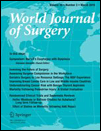A Pilot Survey of Pediatric Surgical Capacity in West Africa
Abstract
Background
While some data exist for the burden of pediatric surgical disease in low- and middle-income countries (LMICs), little is known about pediatric surgical capacity. In an effort to better plan and allocate resources for pediatric surgical care in LMICs, a survey of pediatric surgical capacity using specific tool was needed.
Methods
Based on the previously published Surgeons OverSeas Personnel, Infrastructure, Procedure, Equipment, and Supplies (PIPES) survey, a pediatric PIPES (PediPIPES) survey was created. To ensure relevance to local needs and inclusion of only essential items, a draft PediPIPES survey was reviewed by nine pediatric surgeons and modifications were incorporated into a final tool. The survey was then distributed to surgeons throughout sub-Saharan Africa. Data from West Africa (37 hospitals in 10 of the 16 countries in the subregion) were analyzed.
Results
Fewer than 50 % (18/37) of the hospitals had more than two pediatric surgeons. Neonatal or general intensive care units were not available in 51.4 % (19/37) of hospitals. Open procedures such as appendectomy were performed in all the hospitals whereas less-invasive interventions such as non-operative intussusception reduction were done in only 41 % (15/37). Life-saving pediatric equipment such as apnea monitors were not available in 65 % (24/37) of the hospitals.
Conclusions
The PediPIPES survey was useful in documenting the pediatric surgical capacity in West Africa. Many hospitals in West Africa are not optimally prepared to undertake pediatric surgery. Our study showed shortages in personnel, infrastructure, procedures, equipment, and supplies necessary to adequately and appropriately provide surgical care for pediatric patients.




